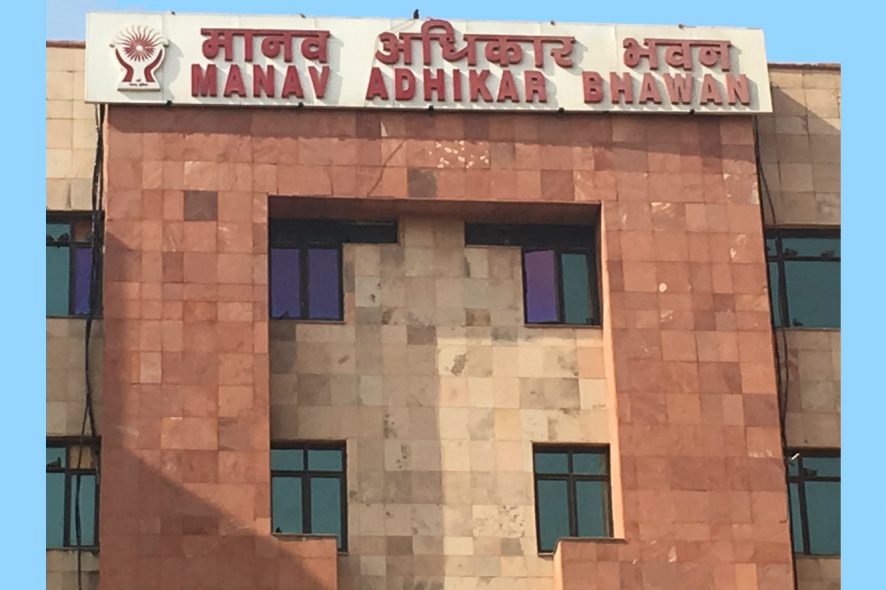The National Human Rights Commission has filed an application for intervention and directions along with suo motu writ petition No. 6 of 2020 in the Supreme Court of India on the problems and miseries of migrant labourers, who had been stranded in different parts of the country after the nationwide lockdown.
The Court admitted the intervention application of the Commission. The Commission has sought directions from the Supreme Court for consideration of implementation of its proposed short term and long term measures in order to decrease the plight of the migrant workers and to ensure that the human rights of these poor labourers are not violated.
Short term measures include:
i. In order to estimate the in-flow of migrant workers, States should collect the data of migrant workers at the point of departure in the originating States as well on arrival in the destination States. This will help States to effectively plan quarantine and relief measures for the migrant workers.
ii. The Government of India and the State Governments must ensure proper implementation of the Inter-State Migrant Workmen (Regulation of Employment and Conditions of Service) Act,1979 so that the migrant workers are provided with a journey allowance.
iii. Menstrual hygiene products should be provided to migrant women and adolescent girls across the country.
iv. Each state should be directed to ensure proper functioning of shelter homes especially for the accommodation of pregnant women, lactating mothers, children, and elderly person. It should be ensured that medical facilities and nutritious food are available in these shelter homes.
v. Each State should be directed to identify the industry in which the migrant labour is working i.e. construction, agriculture, brick kiln, etc. This identification will aid the State in creating schemes for the migrant workers and in the preparation of a State-wide and Nation-wide database.
vi. States should be directed to take steps for the support of migrant workers, similar to the steps taken by the State of Odisha which has set up a toll-free Sharmik (labour force) Sahayata Helpline, Migrant Labour Help Desk, seasonal hostels for the children of migrant workers, and has strengthened Anti-Human Trafficking Units for migrant workers.
vii. States must ensure medical facilities for check-ups for migrants before and after the journey, as well was availability of food and medical care during the journey. For migrants who are walking or travelling on bicycles, food and water should be made available both at the originating and destination states, as well as en route.
viii. The originating States should take steps to identify the destitute among the migrant labour and provide some quantum of compensation to ensure that they do not resort to begging after reaching their destination.
ix. Railways in consultation with the respective State Governments should ensure that such delays do not take place and the trains do not reach wrong destinations. A mission similar to that of the dedicated Vande Bharat Mission should be started in a phased manner to help migrant workers reach their source destination.
x. A fund should be created for payment of ex-gratia relief by the concerned DM, which will provide fixed compensation to every migrant returning home.
Long term measures include:
i. A special provision to be inserted in the Inter-State Migrant Workmen (Regulation of Employment and Conditions of Service) Act, 1979 to deal with emergency situations like Covid-19, natural disasters etc.
ii. Appointment of a claim commissioner to look into recovery from employers who abandoned their labourers despite notification for continuity of wages by Central Govt.
iii. Allocation of funds to states to be allotted to gram panchayats in order to create employment opportunities in the home states of migrants.
iv. National portal for registration of migrants so that a nationwide database is created.
v. Compensation to family members of those who died while migrating to their respective states.
vi. Universal Ration Card to be granted to migrants
vii. Maximum benefits be extended to the migrant labour as provided for under the Unorganised Workers’ Social Security Act, 2008
viii. The government should implement its scheme, that it had announced to launch, for affordable rental housing complexes for migrant workers and urban poor as soon as possible.
ix. There should be a Nodal agency created under the Ministry of Labour for the resolution of Inter-State migrant labour issues. A study of best practices from other countries on issues concerning migrant labour could be commissioned.
x. Simplified registration process for ensuring the understanding capability of the migrant workers. In this context, the issue of giving a universal number / smart card with portability of migrant workers may be revisited.
NHRC
Press Release dt. 05-06-2020






